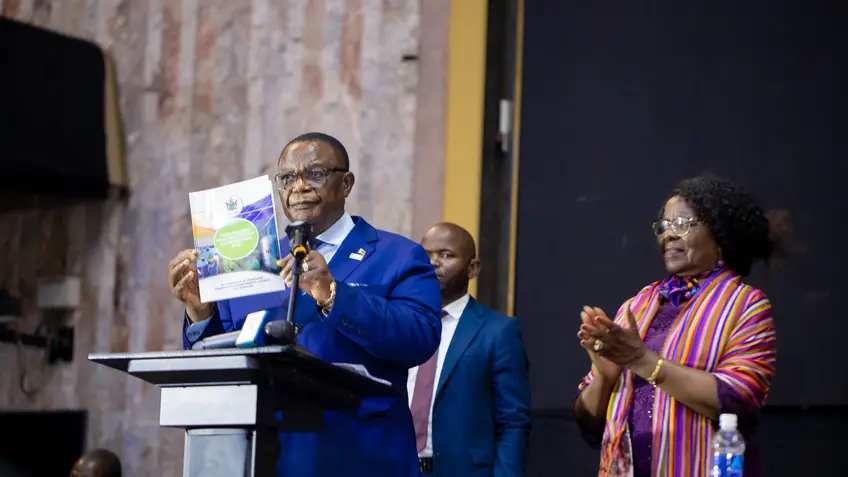Zimbabwe Unveils Series of Climate Plans to Accelerate National Action
Zimbabwe unveils four national climate plans to strengthen resilience and align national climate action with global ambition raising efforts.
Harare, Zimbabwe, 2 Oct. 2024 — The Government of Zimbabwe unveiled four national climate plans, marking government-wide efforts to drive ambitious climate action across major economic sectors and strengthen national resilience.
At the launch event in Harare, the second "Climate Change and Development Conference,” the government released four cornerstone plans, including its plan for implementing its Nationally Determined Contribution (NDC) under the Paris Agreement, a Long-Term Low-Emissions Development Strategy (LT-LEDS) with an accompanying NDC investment framework, a national adaptation plan and a green and resilient recovery strategy.
Vice President of Zimbabwe H.E. Dr. Constantino Chiwenga: “Achieving our climate and development goals requires substantial investment. The climate investment framework is designed to mobilize the innovative resources required to implement our LT-LEDS and the revised NDC effectively. This framework is not just a funding mechanism — it is a strategic approach to attracting investment in green technologies, renewable energy, sustainable agriculture and resilient infrastructure. It provides clear pathways for central government, local authorities, the private sector, development partners and financial institutions to participate in Zimbabwe's green transition. Investment in climate resilience and low-carbon development is an asset for our economy, creating jobs, spurring innovation and building a more inclusive and sustainable economy.”
NDC Partnership Global Director Pablo Vieira: "The launch of these ambitious plans demonstrates the Government of Zimbabwe’s leadership in making climate action a catalyst for economic growth and transformation, while contributing to global ambition raising efforts. Zimbabwe’s implementation plan and investment framework provide critical guidance that will drive resources and help mobilize finance for the full implementation of Zimbabwe’s NDC and strategic national priorities.”
United Nations Resident Coordinator, Mr. Edward Kallon: “Bold NDCs can usher in a green transition and integrate climate considerations with national development priorities, plans and investments. National ownership of these contributions is essential; it empowers us to transition our economies in a way that meets the goals of the Paris Agreement and achieves the SDGs. Climate finance is crucial in this context. It enables us to transition towards greener economies, supports climate-resilient infrastructure and helps protect the livelihoods of vulnerable communities. Without adequate climate finance, our aspirations for sustainable development and climate resilience remain at risk.”
Deputy Group Chief Executive, FBC Holdings Limited, and Managing Director of FBC Bank Limited Mr. Webster Rusere: “We pledge our continued support to the Government of Zimbabwe in building on various green projects FCB is supporting in line with the national green resilient recovery strategy, which includes three green projects: green hydrogen for fertilizer production, geothermal energy production and climate smart agriculture and digitalization for sustainable markets and respective feasibility studies for submission to the GCF for funding.” FCB Bank Limited is an accredited entity of the Green Climate Fund (GCF) in Zimbabwe.
Zimbabwe developed its implementation plan and investment framework with support from the NDC Partnership. Together, these plans create a strategic blueprint for collaboration across ministries, development partners and non-state actors and investment in national climate priorities that drive sustainable development in Zimbabwe.
The NDC implementation plan adopts an integrated whole-of-society approach to translating Zimbabwe's 2030 climate commitments into actions that support national development and long-term climate planning. With the NDC implementation plan now in place, Zimbabwe is focusing on mitigation and adaptation actions across eight major economic sectors, including agriculture, energy, forestry and land use, industry, infrastructure, disaster risk management, water and waste.
The Second Climate Change and Development Conference was organized by the Zimbabwe Ministry of Environment, Climate and Wildlife in coordination with the NDC Partnership, the University of Zimbabwe’s Environment, Climate and Sustainable Development Insitute, the International Centre for Tropical Agriculture (CIAT), the United Nations Development Programme (UNDP) and UNICEF. The conference brought together nearly 600 participants across government, the private sector, academia and civil society.
A member of the Partnership since 2017, Zimbabwe has actively engaged with the NDC Partnership to advance its climate action agenda, including requesting support for updating and aligning its NDC with its LT-LEDS in 2021, developing the 2021-2030 NDC Implementation Plan and the 2024-2030 LT-LEDS and NDC Investment Framework with UNDP support in coordination with Genesis Analytics, an Africa-based impact firm. The NDC Partnership has also deployed an In-Country Facilitator to support government efforts to coordinate NDC action, with support from UNDP.
For more information on climate action in Zimbabwe including the national documents launched today, please visit the Zimbabwe country page here.
For Media Inquiries
Caity Pinkard, Communications Manager, NDC Partnership Support Unit: caitlin.pinkard@ndcpartnership.org
About the NDC Partnership
The NDC Partnership is a global coalition, bringing together more than 200 members, including more than 130 countries, developed and developing, and nearly 100 institutions to deliver on ambitious climate action that helps achieve the Paris Agreement and drive sustainable development. Governments identify their NDC implementation priorities and the type of support that is needed to translate them into actionable policies and programs. Based on these requests, the membership offers a tailored package of expertise, technical assistance and funding. This collaborative response provides developing countries with efficient access to a wide range of resources to adapt to and mitigate climate change and foster more equitable and sustainable development.
